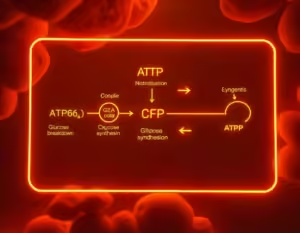Mitochondria are vital to our health and well-being. Often called the “powerhouse of the cells,” these tiny organelles give our bodies with energy. By learning about their important functions, we can understand more about our energy levels, metabolism, and overall health. Mitochondria power our cells and support life. But, if they don’t work properly, we can feel tired, sick, or face more serious health problems. Thus, it’s essential to explore mitochondrial functions and their effects on our health. We’ll also look at how they relate to various diseases. Understanding these connections can help us take better care of ourselves.
What Are Mitochondria?
Mitochondria are tiny structures found inside our cells. They look like little sausages. They can number in the hundreds or thousands. This depends on the energy requirements of the cell. These organelles play a vital role in producing energy for the body. They take in nutrients and turn them into adenosine triphosphate (ATP), which serves as our body’s energy currency. In short, mitochondria are essential for keeping our cells energized and functioning well.
Functions of Mitochondria

1. Energy Production
Mitochondria generate ATP through a process called cellular respiration. Here’s how it works:
- Glucose breakdown: When we eat, our bodies break down carbohydrates into glucose.
- Conversion: Mitochondria use glucose and oxygen to make ATP.
- Energy release: ATP provides energy for muscle movement, brain activity, and other vital processes.
Without efficient ATP production, we feel tired and sluggish.
2. Regulation of Metabolism
Additionally, mitochondria help regulate our metabolism. They play a key role in processing fats and sugars in our bodies. When mitochondria work well, they contribute to maintaining a healthy weight and energy balance.
- Fat Oxidation: Mitochondria break down fat, turning it into energy.
- Sugar Regulation: They also help control blood sugar levels, which impacts conditions like diabetes.
3. Role in Apoptosis
Additionally, mitochondria are important for apoptosis, or programmed cell death. This process removes damaged or unnecessary cells, which helps preserve our health:
- Preventing Cancer: By eliminating cells that become cancerous.
- Supporting Tissue Health: Allowing our body to replace old cells with new ones.
When mitochondria malfunction, they can fail to trigger apoptosis, leading to various health issues.
Health Connections
Furthermore, mitochondrial dysfunction can lead to several health problems. When these organelles do not work optimally, they can contribute to:
- Chronic fatigue syndrome: Persistent exhaustion can result from poor mitochondrial activity.
- Neuron degenerative diseases: Conditions like Alzheimer’s and Parkinson’s also be linked to mitochondrial concerns.
- Diabetes: Impaired mitochondrial operation can disrupt blood sugar regulation.
As a result, maintaining mitochondrial health is essential to prevent these diseases.
Developing Mitochondrial Functions
Fortunately, you can take steps to support your mitochondria and improve their role. Here are some effective strategies:
1. Diet
Eating a balanced diet is essential for mitochondrial health. This includes:
- Coenzyme Q10 (CoQ10): Found in fatty fish and nuts, it supports ATP production.
- Omega-3 Fatty Acids: Found in fish, flaxseeds, and walnuts, they reduce inflammation and promote healthy mitochondria.
- Antioxidants: Foods like berries, dark chocolate, and leafy greens protect mitochondria from damage.
2. Exercise
Additionally, regular physical activity enhances mitochondrial functions. Exercise:
- Boosts ATP Production: More energy is generated during and after workouts.
- Increases Mitochondrial Biogenesis: Moreover, exercise encourages the creation of new mitochondria, improving overall energy levels.
Even simple activities like walking or biking can make a significant difference.
3. Supplements and Therapies
Some people also gain from supplements. Here are some popular options:
- CoQ10: Supports energy production.
- L-Carnitine: Helps transport fatty acids into mitochondria for energy.
- Alpha-Lipoic Acid: Acts as an antioxidant, protecting mitochondria from damage.
Still, always consult a healthcare professional before starting new supplements.
Mitochondria and Disease
Research shows that mitochondrial dysfunction can harm health in several ways. For example, when mitochondrial operation is impaired, it can lead to insulin resistance, which increases the risk of diabetes. Additionally, poor mitochondrial health is linked to cardiovascular diseases and neurodegenerative disorders. Hence, supporting mitochondrial operation is essential. By doing so, we can help reduce the risk of serious health conditions.
Conclusion
Mitochondrial functions are important for our energy and overall health. When we focus on these functions, we can make better choices for our well-being. For example, adopting a healthier lifestyle can increase our energy and improve our health. Furthermore, even small changes can lead to significant improvements.




